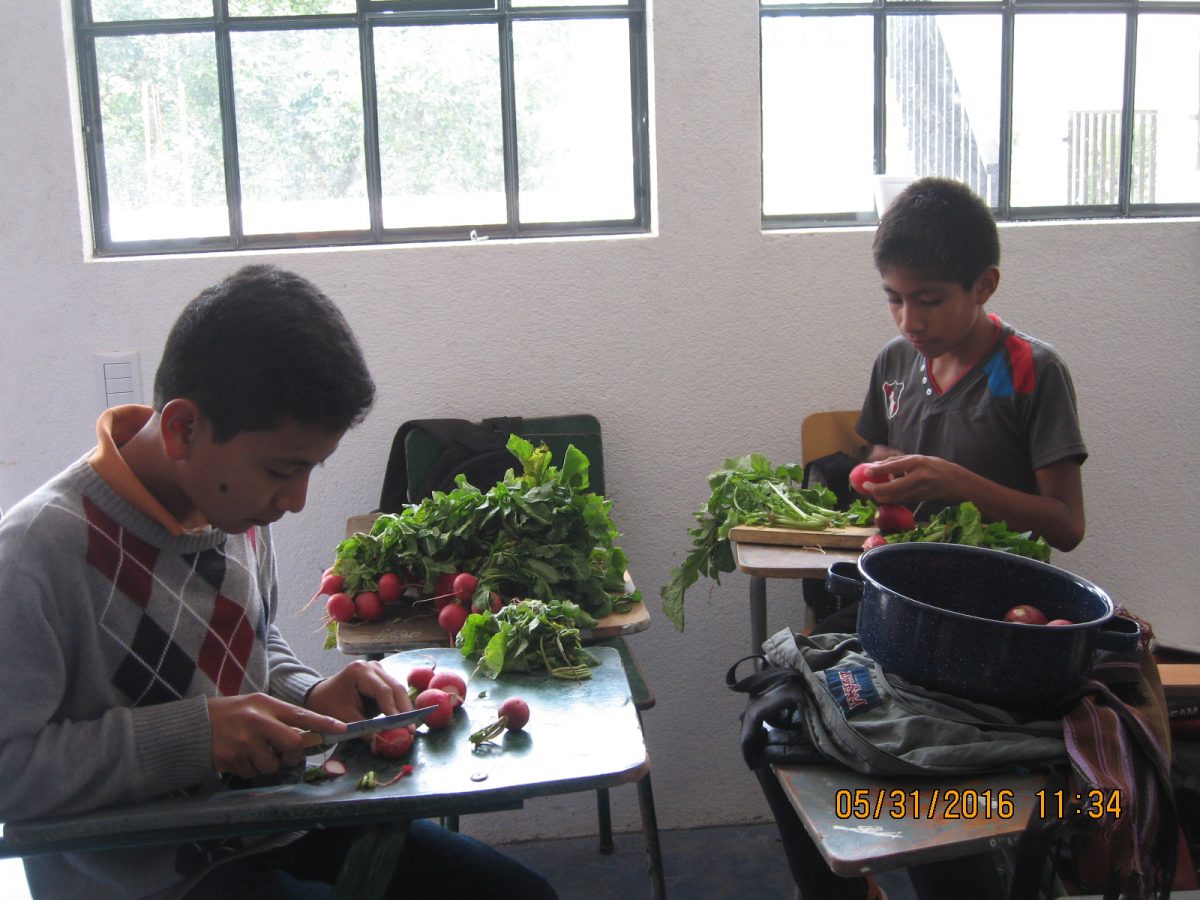By Ingrid Paredes, Chacaya Program Coordinator
JUSTA organizes activities with the students of the Chacaya Institute in order to stimulate their abilities and improve their education through workshops, chats and holistic routines. This month´s activity was a nutrition and cooking workshop. The goal of this activity was to inspire students to cook and eat healthy recipes, using locally produced ingredients. In teaching them cooking with creativity, students can prepare inexpensive delicious meals without processed ingredients.
To educate on how to get a balanced diet is not that simple when working with communities that live in poverty. Rural communities in Sololá, and most regions in Guatemala, subsist on agriculture; primarily corn, with some beans and vegetables. Due to cultural habits, poor access to education or proper information, lack of job opportunities and low income, their diet is also based on mostly corn and small portions of beans and vegetables. These families eat meat only for special occasions, since the price per pound of meat in Guatemala equals half of the daily income of most farm workers in Chacaya. Some of the families can afford to raise some chickens, but they are eaten only during celebrations.
There is no market in San Antonio Chacaya. Women have to pay 7 quetzales (roughly one dollar) for transportation that takes them to Santiago Atitlán´s market in order to buy food and/or sell the vegetables or corn that they have grown. Poor access to basic services such as clean water, drains, and suitable latrines make it more difficult to get proper nutrition. Many people have parasites due to unsanitary living conditions, which makes nutrient absorption difficult. In addition, it is challenging to maintain proper hygiene with limited or unclean water.

Despite these limitations, we cooked a balanced yet affordable, and delicious menu for our nutrition workshop with Esperanza, a great facilitator from CEPANESA Association at Chacaya Middle School. The meal consisted of “hierbamora” and radish leaf burgers mixed with eggs, with homemade tomato sauce. For the sides we cooked a radish, tomato and carrot salad, dressed with onion, mint and lemon, and for dessert we prepared a fruit salad with mango and dragon fruit, and fresh squeezed lemonade for a beverage.
All of the students collaborated with the preparation, washing the vegetables (even when we had limited water), cutting, mixing, cooking, frying, serving… and finally, we enjoyed the meal together. Even the seasoning mix Esperanza helped us prepare was delicious.

The cost of each dish was about 4 quetzales (or 50 cents), so one family could afford 10 balanced meals with just one half-day of work. An average number of members per family in rural communities is 6, and this meal is a much better than the fried chicken and potatoes that they often eat due to fast food businesses that have infiltrated communities.
On the other hand, rural indigenous communities are known for pushing women into the background, reserving for them duties such as cooking, doing the laundry, cleaning, and taking care of the kids, all activities requiring them to stay home. Therefore men are usually served by women during meals. We were pleasantly surprised when during our workshop the boys were the first who wanted to cook! Things are changing, and hopefully the mindset of these youth is opening to new possibilities and alternative ways of living. This gives us hope for the next generation to make the change!
I ran into one student´s mother. I told her that her son was cooking rice, and asked if he also collaborated cooking at home. “Sometimes,” she said, “actually he wants to become a chef”.
Unfortunately, we don´t know if that would be possible yet since she is raising her son alone. His father could have been a victim of the civil war, he could have died of disease due to a deficient healthcare system, or he could have just abandoned them. These are all common situations. I can say this boy has many qualities for becoming a successful chef, an artist, a physician, or an engineer. All he and his peers need is to keep going with their studies in order to make all these dreams come true.

JUSTA supports many of these students by providing scholarships to families in-need. If you want to be part of this effort, you can make a donation to help these kids to have a better future…Donate here!

